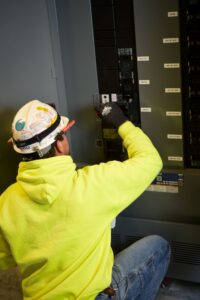03.28.2024
The Importance of Electrical System Maintenance
 For decades, electrical equipment manufacturers have given recommendations on how to properly care for their manufactured products. These recommendations were in place to ensure that equipment functioned properly and that breakers tripped when there was an electrical fault. For many organizations, these guidelines were not followed, and electrical equipment was run until it no longer functioned as intended. At that point, it was replaced with new equipment.
For decades, electrical equipment manufacturers have given recommendations on how to properly care for their manufactured products. These recommendations were in place to ensure that equipment functioned properly and that breakers tripped when there was an electrical fault. For many organizations, these guidelines were not followed, and electrical equipment was run until it no longer functioned as intended. At that point, it was replaced with new equipment.
We do not typically talk about the need to maintain your electrical equipment like we do with cars. Everyone knows that your vehicle’s oil should be changed every 3,000 to 5,000 miles for natural oils or 7,500 to 15,000 miles with synthetic. We also know that we need to keep air in our tires, change our air filters, change transmission fluid, etc. Newer vehicles even tell us when the vehicle requires maintenance, and car dealerships are now starting to reach out to clients when they can see through manufacturing applications that a vehicle needs servicing.
What should you be doing to keep your electrical system in working condition? First you need to understand or have a partner that understands how to maintain your electrical equipment. Each piece of equipment has a separate set of tests to ensure proper function. Imagine what could happen if a breaker did not open when there was a fault, or what would happen if an oil-filled transformer started on fire because there was too much degradation of the oil. For most commercial and industrial facilities, the avoidance of unplanned downtime is enough to warrant proper cleaning and testing of electrical equipment. The electrical system is the heart of commercial and industrial buildings. Without a working electrical system, no product is being produced, employees may be displaced, and the monetary losses continue to escalate until the equipment is back in working order.
There is another important reason to follow the manufactures guidelines; NFPA 70B. The National Fire Protection Association was established in the late 1800s in response to fires in the commercial and industrial space. Too many people lost their lives in countless fires across the country; something needed to change. In 1896, the NFPA was born and started with the standard for sprinkler systems. One year later, they developed the first National Electrical Code (NEC), with standards continuing to be developed and updated that electricians must follow yet today. In 1973, NFPA 70B was created to give recommended practices for maintaining electrical systems. Just like your vehicle’s owner’s manual, the NFPA 70B was a recommended practice. Nobody was going to cite you for not maintaining your main electrical equipment, just like nobody would give you a ticket for running your car 7,000 miles on natural oil.
That is until 2023, when the NFPA 70B became a standard. Now it is no longer a recommended practice, but is enforceable under the Occupational Health and Safety Administration (OSHA). You may ask, why does OSHA care about how I maintain my electrical equipment? They do not care if my electrical system faults and affects my production. While that may be true, what OSHA does care about is employees. So how does the maintenance of our electrical systems mean that we are taking care of our employees? There is another part within NFPA, NFPA 70E, which are the standards that cover how employees shall be protected when working on electrical systems.
Imagine this scenario: you have an NFPA 70E study completed for your facility. With that study there are standard trip curves used depending on the overcurrent protective device used. The potential exposure for a worker comes down to two key factors: available fault current and time before the overcurrent device tripping. A worker may be exposed to a greater hazard if the overcurrent device does not perform as calculated. This means workers can be under-protected and could be exposed to severe or life-threatening conditions because the electrical system was not properly maintained.
What is the worst that can happen when we ignore our car manufacturers’ recommendations? Typically, it just means more money out of our pockets; rarely does it mean an injury to the driver, passengers or others on the road. In the electrical world, this is different. It is not just about lost revenue or profits; it is also about employee safety and ensuring everyone goes home in the same condition or better than how they arrived at work.
What steps are you taking to ensure your electrical system will perform as expected, and keeping your employees out of harm’s way? Contact us to learn how we can support your electrical systems and ensure their safest operation.
If you enjoyed this blog article, please subscribe to stay up to date on the latest industry news from our experts at Faith Technologies.



